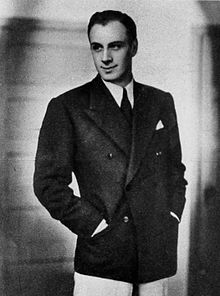Russ Colombo
| Russ Columbo | |
|---|---|
 |
|
| Background information | |
| Birth name | Ruggiero Eugenio di Rodolpho Colombo |
| Born |
January 14, 1908 Camden, New Jersey, U.S. |
| Origin | Rome, Italy |
| Died | September 2, 1934 (aged 26) Los Angeles, California, U.S. |
| Genres | Jazz, popular music |
| Occupation(s) | Actor, singer, violinist |
| Instruments | Violin, baritone voice |
| Years active | 1921–34 |
Ruggiero Eugenio di Rodolfo Colombo (January 14, 1908 – September 2, 1934), known as Russ Columbo, was an American baritone, songwriter, violinist and actor. He is famous for romantic ballads such as his signature tune "You Call It Madness, But I Call It Love" and his own compositions "Prisoner of Love" and "Too Beautiful For Words."
Columbo was born in Camden, New Jersey, the twelfth child of Italian immigrant parents, Nicola and Giulia (Julia) Colombo. He attended Everett Grammar School and started playing the violin at a very young age and debuted professionally at the age of 13. His family moved to Los Angeles when he was 16, and he attended Belmont High School there, left high school at age 17 to study violin under Calmon Luvovski and travel with various bands around the country. He sang and played violin in numerous nightclubs.
By 1928, at the age of 20, Columbo began to participate in motion pictures, including a Vitaphone short in which Columbo appeared as a member of Gus Arnheim and His Orchestra. Eventually, he did obtain some feature work in front of the camera, but he slowed down his activities in cinema to pursue other interests. At the time of his death, Columbo had just completed work on the film Wake Up and Dream; he was on his way to stardom when his life was cut short. Among Columbo's other films are: Woman to Woman (with Betty Compton), Wolf Song (with Lupe Vélez), The Texan (with Gary Cooper), and Broadway Thru a Keyhole.
Columbo performed seven vocals while with Arnheim as a member of the string section, six for Okeh Records and only one for Victor ("A Peach of a Pair") on June 18, 1930, a few months before Bing Crosby joined the band, along with Al Rinker and Harry Barris as "The Rhythm Boys").
...
Wikipedia
